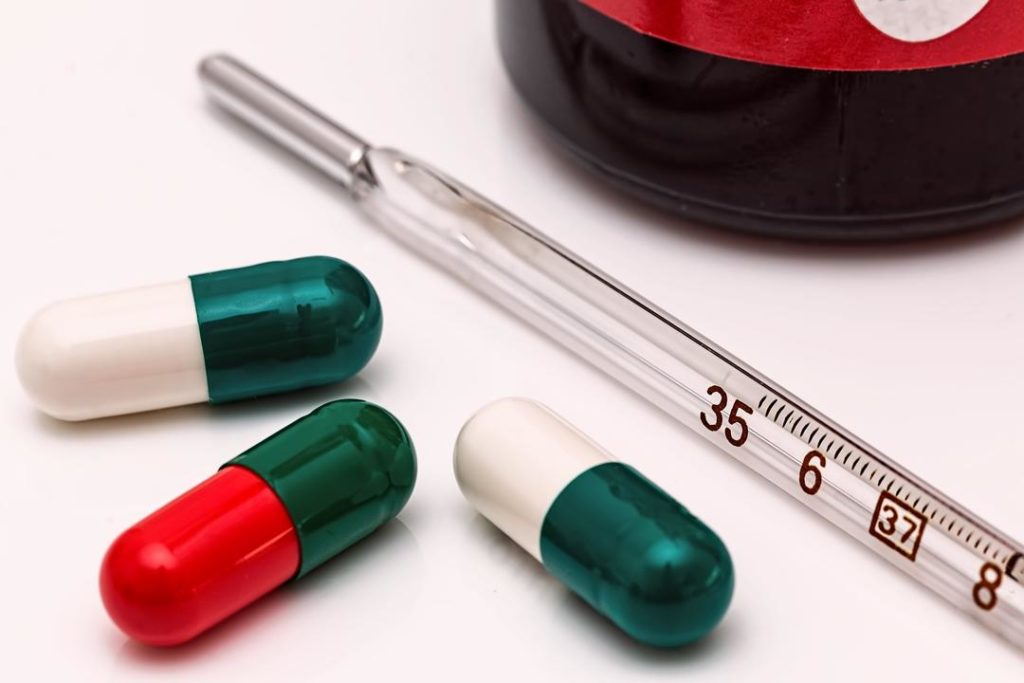
Contents
Managing Fever at Home
- Follow the medication dose and interval as per body-weight, as instructed. Do not exceed individual dose and total dose in a 24-hour period.
- Cold Sponging, or Cold Compresses, help the body temperature come down quickly. You can use a cold damp washcloth (small towel) to sponge areas like armpits, feet, hands, and groin to reduce body temperature. Do this at regular intervals to control a high fever, for example, in-between medications.
- Sponging full body is recommended, and especially head and feet. A child can even be given a cold water bath to cool down the body – heat loss by evaporation.
- Ice-water can be used for sponging. If the person is shivering with chills then use just cool water.
- While sponging, rub gently to open the pores to increase heat loss
- Avoid heavy blankets as it will prevent heat dissipation. Air-circulation thru fan is better than AC. Circulating air helps reduce body temperature by evaporation.
- Apply cold compress/sponging even if the patient has a cold – it may not help cold symptoms but fever must be contained.
- Easily digestible food should be taken – such as rice, daal, khichdi, curd, fruits etc.
- Avoid reading or watching TV or mobile when sick – it can cause unnecessary strain on eyes and lead to headache. Listen to soothing music, instead.
- Bed rest is very important to give body the time to recover from weakness
- Lack of fluids in the body can lead to dehydration and more problems. Fluid-intake must, therefore, be maintained. Dehydration can make children drowsy and quiet – a symptom to watch out for.
- Keep the patient hydrated by giving him/her plenty of water – in the form of water, juice, buttermilk, coconut-water, soup, milk, etc. Lack of water can lead to other symptoms like headache, weakness, etc.
Managing Diarrhoea
- The diarrhoea will make you dehydrated. To prevent this, increase your fluid intake. It will keep your body hydrated. The fluid will enable your body to eliminate waste toxins and maintain hydration.
- Oral Rehydration Solution – ORS – must be taken at regular intervals to compensate for fluid and electrolytes lost.
- ORS also treats and prevents diarrhoea. If there is no fever or other worsening symptoms then antibiotics may not be required.
- ORS home remedy – 1 liter water, 1 fist of sugar (8tsf (40 gms) sugar or 4tsf glucose), 1/2 tsf salt, half a lemon and 1/3 tsf of baking soda. Mix all the ingredients and drink at regular interval.
- Bananas can treat diarrhoea in people enduring fever. The pectin present in bananas is a soluble fiber that helps absorb liquid in the intestines, thus reducing diarrhoea.
- Curd has probiotics that helps contain the bacteria. Together with rice – its a good, easy-to-digest food that gives energy and soothes the intestines
- Zinc in diet – thru food and supplements – reduces quantity and frequency of stools
- Cloves also help ease vomiting and diarrhoea, two common symptoms of typhoid.
General Tips
Observe Good Hygiene
- Drink bottled or boiled/filtered water
- Ensure that utensils and containers for food and water are also clean
- Wash your hands properly before cooking, eating food or otherwise handling food in any manner
- Maintain decent sanitation and hygiene to avoid spreading the disease
- Be wary of unhygienic, street food. Always opt for home cooked food
Foods to Take
- Prevent dehydration. Eat fresh fruits rich in Potassium and other minerals – banana, coconut water, citrus fruits like lemon, lime, oranges, musambi etc.
- Take buttermilk and curds – they are easy on the stomach and very beneficial.
- Consume fresh juice from orange in order to maintain coolness and hydration for the body.
- Add the juice of 1 lemon and a little honey to a glass of warm water and drink it 2 or 3 times a day.
- Eat simple foods like porridge, legumes with rice, grilled fish and boiled or raw vegetables.
- Consume more soups and smoothies with green vegetables in the daily diet.
- Eat high-nutrition foods which are rich in protein, carbohydrate, iron, potassium, fiber, and sodium.
- Spices & foods like garlic, cloves, turmeric etc. have natural anti-microbial properties that can help. Balanced diet and nutrition during healthy days build immunity to keep infections away.
Foods to Avoid
- Avoid milk during diarrhoea.
- Avoid eating meats and sugary items for a few days.
- Do not consume vegetables and fruits without proper washing and peeling of the skin.
- Do not take stimulants like alcohol, caffeinated beverages, tea, coffee, carbonated drinks, and spicy foods.